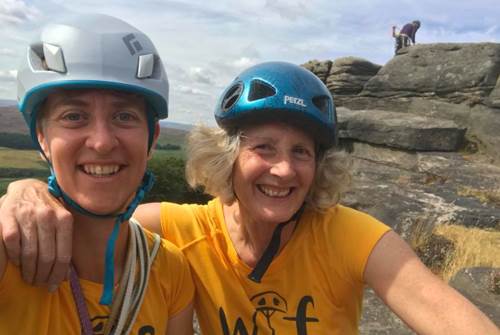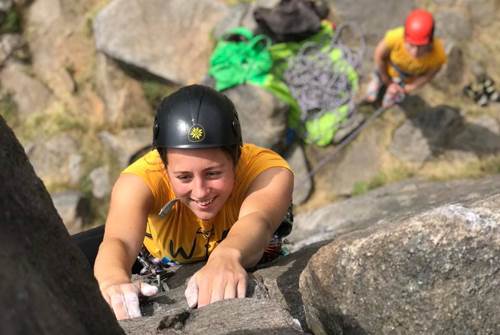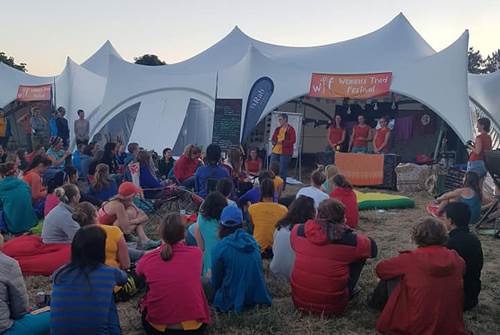Women's Trad Fest 2018 - Q&A

It was great to chat to so many people throughout the Women’s Trad Fest weekend about Mountain Training qualifications and climbing in general. Here are some of the questions that came up more than once…
1. What grade do I need to climb to become a Rock Climbing Instructor?
In order to attend a training course the personal climbing requirements are:
- 15 led trad routes (any grade)
- 15 led indoor routes (any grade)
- 5 led outdoor sport climbs (any grade)
In order to attend an assessment course the personal climbing requirements are:
- 40 led trad routes (at least 20 graded Severe or above)
- 30 led indoor routes at Fr4 or above
- 10 led sport climbs at Fr4 or above
There are other prerequisites which can be found on the
Rock Climbing Instructor page but the above outlines the personal climbing requirements. At assessment the provider will choose a crag and you will be required to lead a trad route of your choice. This route should normally be graded Severe but providers can use their discretion depending on the weather. The assessment is holistic and the assessor will use the syllabus to set tasks and scenarios to determine whether you are competent.
2. Can I do a Mountain Leader course which is run in blocks rather than on consecutive days?
Yes. Some of our providers run ‘split’
Mountain Leader courses which means all of the content is still covered but it may be over the course of two or three weekends (or long weekends) rather than all in one go.
3. How will I know when I’m ready to register/attend training/be assessed?
- Read the relevant web page and handbook to make sure you’re clear about what’s required at each stage.
- If you’re preparing for a training or assessment course, think about sharing your logbook with a provider to get some feedback.
- Don’t inflate the prerequisites and don’t assume that the bare minimum is enough – this might sound contradictory but it’s easy to do one or the other. If in doubt, check the Mountain Training website or give us a call, or share your DLOG with a provider and ask their opinion about your skill level and experience.
- You could also shadow an experienced provider or qualification holder to get some feedback.
4. What’s the new Rock Climbing Development Instructor qualification all about?
This is a new qualification being launched in Spring 2019 (assuming we’re able to finish all the work behind the scenes in time!). It’s designed to train and assess qualified Rock Climbing Instructors to develop climbers further (hence the word ‘Development’), including teaching them to lead climb. More details about the prerequisites will be available in due course and they will be significantly greater than those required of a Rock Climbing Instructor. This is to ensure that you have sufficient personal experience to support the judgements and decision making required of an instructor at this level.
We’re hoping that this new qualification will appeal to a more diverse audience than the Mountaineering Instructor Award because single pitch crags are generally more accessible than mountain crags to the majority of the population and you don’t have to be a mountaineer with a Mountain Leader qualification to get involved. Anyone who’s been a Leader at Women’s Trad Fest will have had a taste of what’s involved in developing climbers and we hope that many of you will consider this new qualification once it’s launched.
5. How can I find other people to practise with?
If you’re working towards one of our qualifications on your own, it’s worth thinking about joining the
Mountain Training Association to meet people near you who are doing the same thing. There are 16 regional groups across the UK and Ireland who run regular socials and skills workshops as well as a nationwide programme of development workshops where you can meet likeminded people as you continue to develop.
Membership costs just £39 per year and the minimum requirement is that you are registered on one of our qualifications.
6. If I’m new to trad climbing, how can I keep developing my skills?
There are a few options:
- If you swapped contact details with your Leader from WTF, get in touch and ask whether they’d be happy to take you out again at some point. Most people will happily spare some time to help others in this way, particularly because trad climbing is one of those things that takes a lot of practice. Some people spend years seconding routes before they start leading so this can be a great way of building your experience.
- Join a climbing or mountaineering club – they often run regular (weekly or monthly) climbing trips which will be a great opportunity to build on what you’ve learned during the weekend. The Pinnacle Club was mentioned a few times at WTF and there are many others - use the BMC or Mountaineering Scotland club finder and find one near you.
- Book onto a course with a qualified instructor and cement everything you learned during the WTF weekend. Mountain Training are launching Rock Skills courses in January 2019 – these will be delivered up and down the country and there are four different courses: Introduction, Intermediate, Learn to Lead Sport and Learn to Lead Trad. The Intermediate level is about becoming a competent second and setting up top/bottom ropes so if you’re not ready to lead yet, that would be a good place to start. When booking a course, ideally you want to look for an experience Rock Climbing Instructor or Mountaineering Instructor Award (MIA) holder.
- Buy a copy of Libby Peter’s Rock Climbing book – it’s a great reference book and will act as a useful reminder of all the things you learned at WTF and may have forgotten in a few weeks’ time.
7. Can I gain a qualification if I’ve got a visual or hearing impairment or other disability?
Probably. Everyone is different so there’s no definitive answer to this question but it’s worth knowing that we have had plenty of people with various disabilities or impairments complete training courses and pass assessments. The key is to discuss what you can and can’t do with one of our providers. They will be able to advise you about what challenges you might face and whether any reasonable adjustments are required to help you complete the course.
8. Do all qualified instructors work full time in the outdoors?
No. Many of the people who hold our qualifications work full or part time in sectors completely unrelated to the outdoors. So if you’re thinking about doing one of our qualifications don’t assume that this has to be the start of a career change and is therefore a really big scary thing (although it absolutely can be if that’s what you want).
A lot of our candidates use their qualification(s) in a voluntary capacity or for part time work to add variety to their lives.
9. How can I start running my own business?
If you want to use one or more of our qualifications to run your own business, that’s a very exciting place to be! Before you give up your day job (assuming you currently have one), think Dragon’s Den and do some market research. Find out what people are already doing, what seems to work and how they’ve structured things. Do they operate all year round and if so, how do they manage the seasonality of the outdoor sector? Thinking about some of these questions should help you narrow down what you want to offer and how it might work. It will really help if you can find a niche, or a unique selling point, that will make you a bit different to everyone else – this could be your product (your courses), your location or you (specialist environmental knowledge for example).
10. Is Mountain Training the same as the MLTA?
No. The MLTA is the old name for what is now the
Mountain Training Association – this is an optional membership association for people who hold, or are working through, our qualifications.
Mountain Training is the brand name for a collection of awarding organisations in the UK and Ireland. We’re responsible for promoting the qualifications, quality assurance of courses and approving providers to deliver them.
Bonus question:
Why does Mountain Training support the Women’s Trad Fest?
In short, because the people at Women’s Trad Fest are our target audience and we recognise the need for women’s specific events, particularly when it comes to trad climbing.
The longer answer…
The attendees at Women’s Trad Fest are mostly women and we’re keen to increase the number of women who hold our qualifications, particularly
Rock Climbing Instructors. To be successful we want to engage with as many women as possible and support them on their pathway to qualification. WTF is a really diverse community of women so by engaging with this community we’re more likely to find out if and where change might be needed.
In addition to this, people who are psyched to trad climb (men or women) are more likely to end up as part of our delivery workforce for our climbing schemes. This is because the
Mountaineering and Climbing Instructor qualification is currently the minimum required to deliver most of our other qualifications. The majority of our course directors are currently men and if we want to encourage more women to gain the necessary experience and join our workforce we need to do everything we can to increase the numbers at the start of the pathway: trad climbing.

